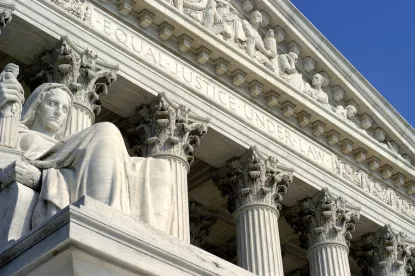On April 22, 2021, the Supreme Court decided Carr v. Saul,1 a case with interesting parallels to Arthrex, which deals with appointments clause challenges to the PTAB judges and which will be decided later this Term. In Carr, the Court was asked to determine if a party may properly challenge the unconstitutional appointment of an administrative law judge (ALJ) during the federal court appeal of the ALJ decision when the party failed to raise the issue during the underlying administrative adjudication. On the facts here, the Court held that a party may challenge the constitutionality of an ALJ’s appointment for the first time in federal court.
Underlying Facts
In Carr, several parties applied for disability benefits from the Social Security Administration (SSA) and were denied. The parties then sought hearings before an ALJ at the SSA and then before the SSA Appeals Council, but again their applications for disability benefits were denied. The parties appealed to the federal district court seeking review of the denials.
In the meantime, the Supreme Court decided Lucia v. SEC2 in which the Court held the appointment of ALJs at the Securities and Exchange Commission violated the Constitution’s appointments clause because they had not been appointed by the head of the agency. Subsequently, the Carr parties raised appointments clause challenges against the ALJs in their disability application appeals. The Commissioner of the SSA argued issue exhaustion applied—that the parties had forfeited their challenges by not raising the appointments clause issue during the agency adjudication. The federal district and appellate courts agreed and the parties petitioned for certiorari.
Growing Weary of Issue Exhaustion
When regulations and statutes are silent on whether issue exhaustion applies in a particular agency, courts should consider the extent to which the underlying administrative proceeding is adversarial (rather than inquisitorial) in nature.3 If the underlying proceeding is adversarial in nature, the parties generally are expected to raise arguments and objections during the proceeding in order to properly preserve the issue on appeal.
Previously, the Court in Sims had determined that the proceeding before the SSA Appeals Council was more inquisitorial than adversarial in nature. But the proceeding before the ALJ was more adversarial in nature and so here the Court had to determine if the proceeding was “adversarial enough to support the ‘analogy to judicial proceedings’ that undergirds judicially created issue-exhaustion requirements.”4
The Court focused on two considerations that “tip[ped] the scales decidedly against imposing an issue-exhaustion requirement.”5 First, the Court noted that agency adjudicative proceedings generally make a poor forum for bringing a structural constitutional challenge, since such a challenge usually falls outside the adjudicator’s area of technical expertise. Second, the Court noted that it has consistently recognized a futility exception to exhaustion requirements, observing that it makes little sense to require litigants to present claims to adjudicators who are powerless to grant the relief requested.
The Court concluded that both considerations “apply fully here: Petitioners assert purely constitutional claims about which SSA ALJs have no special expertise and for which they can provide no relief.”
For these reasons, the Court held that the Carr parties did not forfeit their appointments clause challenges by failing to raise the issue before the agency.
What About Arthrex?
This ruling raises another question: How will the reasoning in Carr affect the Arthrex case currently before the Court? Since the PTAB proceeding in Arthrex is much more adversarial than the SSA proceeding in Carr, had Carr gone the other way one can easily imagine the Court dismissing Arthrex as improvidently granted. But given the actual result in Carr, the effect on Arthrex is less clear.
Compare Carr and Arthrex. In both cases an agency adjudication was appealed to the federal courts and in both cases an appointments clause challenge was raised for the first time in the federal court proceeding. In Arthrex, the agency adjudication in question was an inter partes review (IPR) proceeding before the Patent Trial and Appeal Board (PTAB), filed by Smith & Nephew against a patent held by Arthrex. The government, in its petition for certiorari, asked the Court to determine whether the Federal Circuit erred in adjudicating the appointments clause challenge since Arthrex had not presented that issue to the PTAB. While the Court granted cert on two other questions, it denied cert on the question of issue exhaustion.
On one hand, it is indisputable that IPR proceedings are adversarial in nature. The USPTO describes the proceeding as a “trial” before a panel of APJs, who are technical experts in a field relevant to the patent at issue.6 The Federal Rules of Evidence apply, and a party has the right to cross-examine its opponent’s witnesses. And unlike in Carr (where no statute or regulation obligated petitioners to raise their appointments clause challenges in administrative proceedings), the Board’s typical scheduling order and the one in Arthrex itself expressly cautioned the patent owner that “any arguments for patentability not raised in the response [to the IPR petition] will be deemed waived.” It would seem that the adversarial nature of an IPR could be a sufficient “analogy to judicial proceedings”7 to justify issue exhaustion.
Considerations on the other hand include the general unsuitability of bringing a constitutional challenge before an agency adjudicative body and the futility of presenting the challenge to APJs lacking power to remedy a constitutional problem.
Besides, even if an issue exhaustion requirement would ordinarily apply, an appellate court has discretion to reach the issue despite forfeiture, as the Federal Circuit did in Arthrex based in part on the “exceptional importance” of the issue.
What’s Next for Arthrex?
While it is unlikely that the Court will dismiss Arthrex for issue exhaustion, the final decision still remains to be seen.



 />i
/>i

